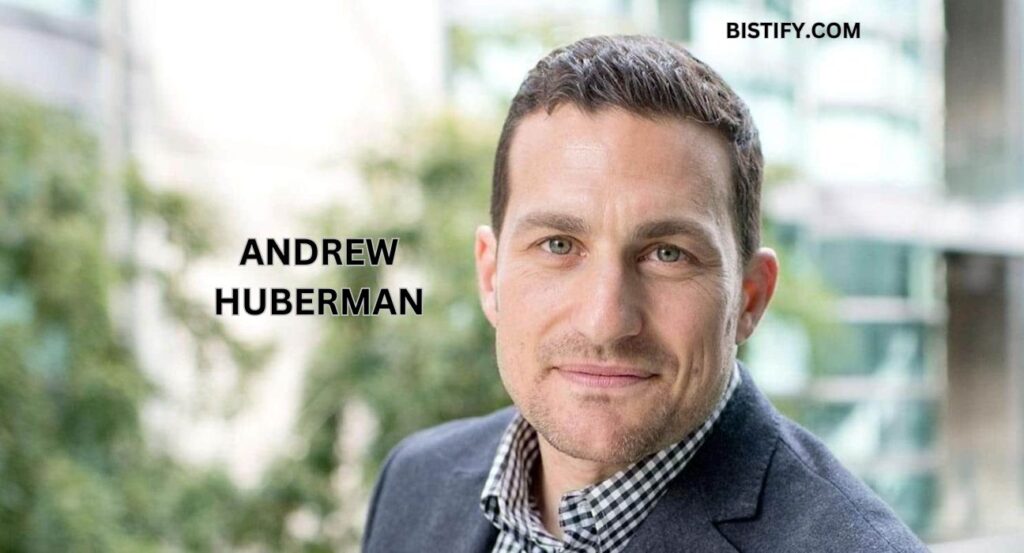Andrew Huberman, a leading neuroscientist and professor at Stanford University, is widely recognized for his expertise in brain health, neuroplasticity, and practical approaches to mental wellness. Through research and his popular podcast, he has effectively connected the scientific community and the public, making complex brain science accessible to everyone.
Here’s a bio of Andrew Huberman in a table format:
| Category | Details |
|---|---|
| Full Name | Dr. Andrew D. Huberman |
| Date of Birth | September 26, 1975 |
| Age | 48 years (as of 2023) |
| Birthplace | Palo Alto, California, USA |
| Nationality | American |
| Profession | Neuroscientist, Professor, Podcast Host |
| Current Role | Professor of Neurobiology and Psychiatry at Stanford University |
| Famous For | Research on brain plasticity and mental health, hosting the Huberman Lab Podcast |
| Primary Research Areas | Neuroplasticity, brain function, mental health |
| Education | B.A. in Neurobiology from UC Santa Barbara, Ph.D. in Neuroscience from UC Davis |
| Podcast | Host of the Huberman Lab Podcast |
| Notable Publications | Over 60 research papers in neuroscience and mental health |
| Estimated Net Worth | Estimated in the high six figures to low seven figures |
| Main Income Sources | Academic salary, podcast revenue, public speaking engagements |
| Social Media Presence | Active on Instagram, YouTube, TikTok, and Twitter |
| Public Engagement Focus | Science communication on brain health, sleep, stress, and cognitive performance |
| Personal Interests | Fitness, health, science communication, engaging with public audiences |
This table provides an organized overview of Andrew Huberman career, research areas, and contributions to neuroscience and public education.
Read More: Yasin Cengiz
A Brief Introduction to Dr. Andrew Huberman
Overview of His Professional Role
Dr. Andrew Huberman is a professor of Neurobiology and Psychiatry at Stanford University, where he conducts research on brain development, behavior, and adaptability. His work has led to groundbreaking discoveries that offer practical applications for improving mental health and cognitive function.
What Sets Andrew Huberman Apart
Huberman ability to explain scientific concepts in an understandable way has made him a unique figure in neuroscience. Through his podcast, he translates technical information into valuable, actionable advice for listeners, promoting health and self-improvement.
Early Life and Academic Journey
Growing Up in California
Raised in Palo Alto, California, Huberman developed a fascination with human behavior and biology early on. This curiosity eventually guided him to a career in neuroscience, where he could explore these interests more deeply.
Educational Background
Dr. Huberman received his undergraduate degree in Neurobiology from the University of California, Santa Barbara, followed by a Ph.D. in Neuroscience from UC Davis. His academic background set the foundation for his innovative research on brain plasticity and adaptation.
Huberman Neuroscience Research
Key Areas of Focus
Dr. Huberman research centers on neuroplasticity, the brain’s ability to change and adapt throughout life. He investigates how experiences and environments shape brain structure, offering insights into mental resilience, behavior, and learning.
Impact of His Findings
Huberman work has influenced areas such as mental health, education, and personal development. His findings are valuable for understanding conditions like anxiety and depression, helping to shape better treatment approaches based on scientific evidence.
Huberman Lab Podcast and Its Purpose
Mission of the Podcast
The Huberman Lab Podcast, launched in 2021, aims to make neuroscience accessible to the public. Through his episodes, Dr. Huberman shares research-based strategies for improving mental health, focus, sleep, and overall well-being.
Topics Covered and Audience Appeal
The podcast covers a range of health topics, including brain health, diet, stress management, and sleep optimization. Its approachable format and practical advice have made it a favorite among listeners who seek scientific insights for personal growth.
Huberman Approach to Mental Health
Practical Tips for Stress Reduction
Huberman offers stress management techniques based on scientific research, such as breathing exercises and visualization techniques. These methods help regulate the nervous system, providing relief from daily stressors.
Enhancing Focus and Mental Clarity
To improve focus and productivity, Huberman recommends techniques like structured focus sessions and strategic breaks. He explains how small lifestyle changes can enhance mental performance, making his advice valuable for students, professionals, and anyone seeking better cognitive function.
Contributions to Neuroplasticity Research
Studies on Brain Adaptability
Huberman research on neuroplasticity sheds light on how the brain adapts in response to new information, experiences, and environments. His studies suggest that engaging in challenging activities can stimulate brain growth, enhancing learning and resilience.
Applications of Neuroplasticity
Huberman insights into neuroplasticity have practical applications in education, therapy, and personal development. By understanding how neuroplasticity works, individuals can take steps to improve their learning, manage emotional responses, and adapt to new situations.

Sleep and Its Role in Cognitive Health
Importance of Sleep According to Huberman
Dr. Huberman emphasizes the essential role of sleep in maintaining cognitive health, emotional stability, and productivity. He highlights how quality sleep can enhance brain function, reduce stress, and improve mental clarity.
Tips for Optimizing Sleep Quality
Huberman shares advice on improving sleep, such as establishing a consistent sleep schedule, managing light exposure, and avoiding stimulants before bed. His science-backed tips make it easier for individuals to enhance sleep quality and overall health.
Read More: Britt Barbie
Exercise and Its Impact on Brain Health
Huberman Views on Exercise and Mental Health
Huberman advocates for regular exercise as a key factor in maintaining brain health. He explains how physical activity supports neuroplasticity, enhances mood, and reduces the risk of cognitive decline, making it a vital part of a healthy lifestyle.
Types of Exercise Huberman Recommends
To boost mental clarity and emotional well-being, Huberman recommends combining aerobic activities like running with strength training. He believes this combination supports both mental and physical health, contributing to long-term cognitive resilience.
Nutrition for Brain Function
Foods That Support Brain Health
Huberman highlights nutrient-dense foods, such as leafy greens, omega-3-rich fish, and berries, as essential for brain health. His recommendations focus on providing the brain with the nutrients it needs for optimal performance and long-term health.
Supplements and Their Role
Huberman also discusses supplements like magnesium and omega-3s, which support brain function and emotional stability. While he advocates for a balanced diet as the primary source of nutrients, he acknowledges that supplements can enhance brain health when used appropriately.
Public Outreach and Influence
Making Science Accessible
Through his podcast and social media platforms, Huberman makes scientific knowledge available to a broad audience. His engaging communication style has made neuroscience relatable, helping people apply scientific insights to their own lives.
Huberman Role in Public Education
Huberman influence extends beyond his research, as he inspires people to adopt healthier lifestyles and make informed choices. By promoting accessible science education, he encourages a proactive approach to health and wellness.
Future Directions for Andrew Huberman
Upcoming Research Focus
Huberman plans to continue exploring areas like neuroplasticity, stress resilience, and mental health. His upcoming research aims to expand our understanding of the brain and contribute to more effective treatment approaches for mental health issues.
Goals for Public Engagement
Dr. Huberman intends to broaden his public engagement through various channels, making science education even more accessible. His commitment to public outreach reflects his mission to help individuals live healthier, more fulfilling lives through a deeper understanding of neuroscience.
Dr. Andrew Huberman
Dr. Andrew Huberman is a neuroscientist known for his research on brain function, plasticity, and mental wellness. Through his work and public outreach, Dr. Huberman has become a trusted source for science-based advice on health and performance, especially via his podcast and social media presence.
Andrew Huberman Lab
The Andrew Huberman Lab at Stanford University focuses on groundbreaking research in brain plasticity, visual perception, and mental health. The lab’s findings contribute to better understanding how lifestyle changes can enhance brain health, making it an influential hub in the field of neuroscience.
Andrew Huberman Wife
Dr. Andrew Huberman keeps his personal life private, including any information about his marital status or spouse. He focuses on sharing valuable insights from neuroscience with the public, keeping his personal details largely out of the spotlight.
Andrew Huberman Stanford
At Stanford University, Dr. Huberman serves as a professor in the Department of Neurobiology. His role at Stanford allows him to lead critical research initiatives and teach, combining his dedication to scientific discovery with a passion for education.
Andrew Huberman Tattoos
Dr. Andrew Huberman tattoos, visible on his arms and hands, have become a notable part of his public persona. These tattoos reflect his unique personality, sparking curiosity among his followers and adding a personal touch to his professional image as a scientist.

Conclusion
Andrew Huberman has significantly influenced both neuroscience and public health education. By bridging the gap between science and practical application, he has empowered individuals to make informed choices for better mental and physical health. His continued work in neuroscience, combined with his commitment to public outreach, ensures that his impact on the field and on everyday lives will continue to grow.
Read More: Michelle Smallman
Frequently Asked Questions
Who is Andrew Huberman?
Andrew Huberman is a neuroscientist and professor at Stanford University, known for his work in brain plasticity, mental health, and public science education.
What does Andrew Huberman research?
He researches brain function, neuroplasticity, and how lifestyle factors like sleep and stress affect mental health and cognitive performance.
What is the Huberman Lab Podcast?
The Huberman Lab Podcast is Andrew Huberman platform for sharing neuroscience-based insights on health, wellness, and personal improvement.
Where does Andrew Huberman work?
He works as a professor in the Department of Neurobiology at Stanford University.
How did Andrew Huberman become popular?
Huberman gained popularity through his podcast and social media, where he breaks down complex neuroscience topics into actionable health advice.
What does Andrew Huberman recommend for better sleep?
He recommends establishing a consistent sleep schedule, managing light exposure, and avoiding stimulants in the evening for optimal sleep.
How does Andrew Huberman suggest reducing stress?
Huberman suggests techniques like breathwork, regular exercise, and visual exercises to reduce stress and support mental clarity.
Does Andrew Huberman discuss nutrition for brain health?
Yes, he highlights the importance of nutrient-dense foods like leafy greens, omega-3s, and berries for optimal brain function.
What is Andrew Huberman approach to focus and productivity?
He advises using focus techniques, structured work sessions, and taking breaks to enhance concentration and productivity.
What are Andrew Huberman future goals?
Huberman aims to continue his research in neuroscience and expand his efforts in public science education, reaching a wider audience with his health insights.

